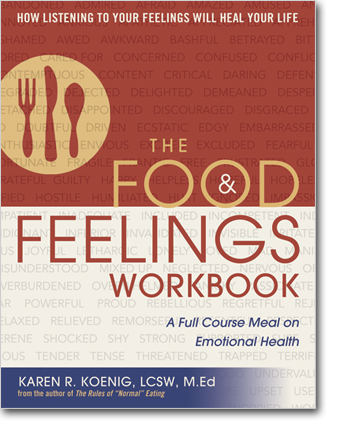
ABOUT THE AUTHOR:

Karen R. Koenig, LCSW, MEd is a psychotherapist, educator, and an expert on the psychology of eating who has over 25 years experience treating people with food and weight issues. Author of the widely-used book, The Rules of “Normal” Eating, she lives in Sarasota, FL where she helps people become “normal” eaters through her therapy practice and workshops. Learn more at www.eatingnormal.com.
Paperback, 216 pg, '07
Product Code: FAF
ISBN: 978-0-936077-20-8
MSRP: $21.95
eBook - epub format
Product Code: EBPFAF
ISBN: 978-0-936077-53-6
MSRP: $9.99
The Food and Feelings Workbook
A Full Course Meal on Emotional Health
Author: Karen R. Koenig, LCSW, M.Ed
DESCRIPTION:
Success in overcoming eating problems depends on learning to effectively and appropriately handle emotions, specifically: guilt, shame, helplessness, anxiety, disappointment, confusion, and loneliness. In this dynamic workbook, Koenig interweaves lighthearted discussion with mindful, reflective exercises to show readers how to identify, experience, and learn from these feelings instead burying them in food-related behaviors.
Writing from a foundation of cognitive-behavioral therapy, Koenig, author of the widely-used book, The Rules of “Normal” Eating, explains:
- The true purpose of emotions
- Why there is no such thing as a “good” or “bad” feeling
- How to stop taking care of everyone else's needs instead of your own
- Why inner pain causes you to focus on weight, food, or appearance
- Ways to trust both your body and your feelings
CONTENTS:
1 – The Function of Feelings
2 – Fear of Feelings
3 – Feelings, Not Food
4 – The Seven Most Difficult Feelings for Disordered Eaters
5 – Guilt
6 – Shame
7 – Helplessness
8 – Anxiety
9 – Disappointment
10 – Confusion
11 – Loneliness
12 – Freeing Your Feelings
13 – Triggers to Intense Feelings and Disordered Eating
14 – Feeling Your Way to Happiness, Health, and a Natural Body Weight
REVIEWS:
“For people struggling with eating disorders, being able to understand, tolerate, and learn from one’s feelings is the key to recovery. Many books tell people to ‘feel their feelings,’ but few fully explain why and how to do this. I am thrilled to discover The Food and Feelings Workbook, which directly addresses working with feelings in an accessible and thorough way.”
— Rivka Simmons, Psychotherapist and Founder of the program Have Your Cake and Eat It Too! A Gentle Approach to Food Your Body and Yourself
“This workbook is filled with wonderful thoughts and ideas that would be helpful for anyone struggling with food and body image issues. Karen presents a step-by-step guide for people struggling with these issues in a commonsense and practical manner. In a lighthearted way, she helps us to stop and identify our feelings in order to be successful in our recovery. While many books stop there, Karen takes us beyond that and provides the tools to actually achieve full recovery. The style of the book is relaxed and supportive and can be read in chapters or just a bit at a time. I expect people to relish the contents of this book. It is a keeper.”
— Beth Mayer, LICSW, Executive Director, Massachusetts Eating Disorder Association
“Emotions need to be navigated, rather than avoided or medicated. But how does one learn? The Food and Feelings Workbook is an important guide to recovery for the emotional eater.”
— Linda Moran, author of How to Survive Your Diet
"Karen tackles the complex relationship between eating and emotions head on! Her advice and non-intimidating style will be welcomed by those who have struggled for years with 'expert advice' for their eating-related issues."
— Audrey Ades, LICSW, ACSW, Psy.D.
EXCERPT FROM The Food & Feelings Workbook:
Why won't bad feelings simply go away?
The truth is, there's actually no such thing as a “bad” feeling. By labeling a feeling negatively, what you mean is that it causes you to feel badly (that is, not pleasurably), or that experiencing it makes you feel as if you're a bad person. Feelings are feelings, just as colors are colors and musical notes are musical notes (and food is food). Think of affects as clouds that have no intrinsic value; whether you welcome them or not is situation-dependent. A cloud blocks out the sun on a scorcher of a day in the middle of a ten-mile hike and you're overjoyed for the respite. A cloud comes along while you're sunbathing and you're momentarily bummed out. How you feel about the clouds is relative, all in your perspective. The same is true of emotions.
If you're wondering why feelings that generate discomfort-what you might call “bad” feelings-won't go and stay away, that's another question entirely and makes me wonder what you believe about emotions. If you believe you're always supposed to feel good, then feeling bad is sure to upset your apple cart. You're not supposed to feel good all the time; it's simply not possible. You-we all-have a range of emotions that come and go and that's the way life is supposed to work. If your colleague blames you for something that's not your fault, you'll probably feel misunderstood. If you've been ignoring your brother for months, you may feel ashamed or guilty; if your best friend steals your girlfriend, you'll likely feel betrayed; if you didn't get the job you thought was a shoo-in, there's a good chance you'll feel disappointed. In all of these instances, you'll feel badly. But these feelings do eventually go away. Of course, the problem is that they'll come back again in another circumstance because that's the way the emotional ball bounces.
We only brush away our feelings if we don't understand their function and value their purpose-if we forget that they exist, for the most part, to instruct us.

